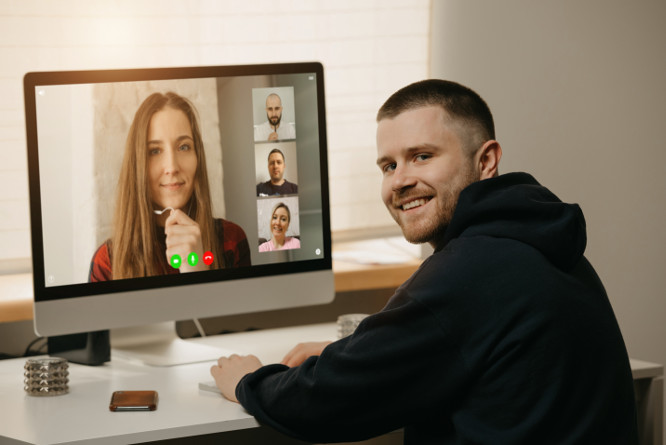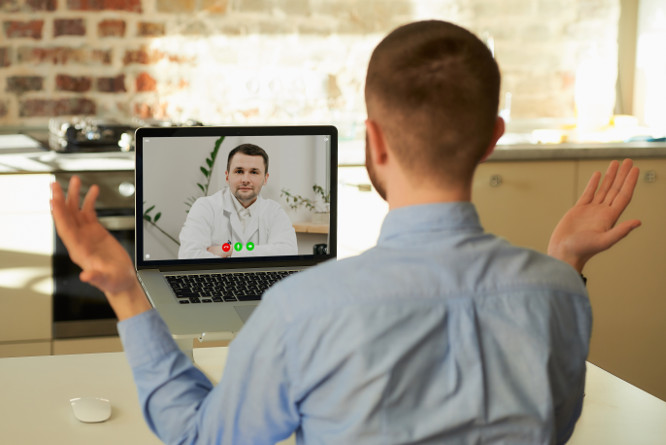ZZZZZoooooooooooommmmmmmmm, and we’re off on a virtual adventure! I don’t know about you, but I’m loving all these Zoom meeting mishaps that are emerging all over the Internet amidst the COVID-19 environment. From men wearing just starched shirts and underwear absent-mindedly standing up in their business meetings (yes, my hubby), to babies running naked into business meetings (yes, my littles), to dogs barking at yet another Amazon package (yes, my Chihuahua), this ultra-techy world has become a necessary evil.
And not just in our business lives. I work out virtually. I connect with close friends and family during our weekly quarantine story times. I order my groceries on-line. I help my five-year-old navigate his e-school. It’s a lot.
Who isn’t familiar with Zoom?
While we attach negative terms like “fatigue” and “burnout” and “mishap” to Zoom, don’t feel too bad for the site. In just the first two months of this virus outbreak, Zoom welcomed over 2.2 million new monthly users, spiking by nearly 380 percent from last year. Its stock has more than doubled this year, giving it a market valuation of approximately $42 billion. Its founder’s net worth has increased by 77% to $7.8 billion, putting him amongst Bloomberg’s top 200 in the world, a list he didn’t even make last year. So, while I might be focusing negative attention on Zoom here, I’m sure it will survive this little article.
And let’s all take a moment to recognize that this blog pertains to other video conferencing apps, as well.
Flexability isn’t only useful in sports!
If you’re like those of us stressed by our new extra-virtual environment, you’re certainly not alone. Seminars and trainings (simulated, of course) are popping up everywhere on how to deal with this suddenly changing landscape. (Seriously, there’s so much money to be made during this pandemic, but that’s another article.) These changes to life as we knew it cause anxiety and fear of what’s to come and grief for all we’ve lost. They make it hard for us to plan ahead or work as we had before. But it’s crucial to our mental wellbeing, as a society, that we adapt to these transformations, while remaining positive and balanced.
We must not only balance our needs, but those of our clients and colleagues. We all need an extra dose of compassion, communication, and flexibility during these novel and uncertain times. Sure, my baby pooped her pants during a zoom meeting, but you’re not even wearing yours. . . . So let’s both be flexible.
Do we all know the same, “My audio isn’t working,” person?
What contributes to this stress? There are many factors, from inexperience with technology to being prevented from truly experiencing another person’s reactions. How many of us have joined a meeting where nobody talks, then everyone talks and no one can hear, then no one talks so as not to interrupt anyone else? This doesn’t seem to happen during in-person meetings, likely because we’re better able to judge other’s cues in person. And there’s always that distracting person who can’t figure out her technology and is sitting too close, too far, in the dark, mute, whatever. Attendees end up spending a disproportionate amount of time simply helping correct these issues so that everyone can be productive.
So how do we ensure that our e-meetings are as productive as they would be in person, while offering the most connection possible?

How to not be that person
1. Know your technology. If you’re using a new virtual site, perform a test-run before the meeting to ensure that you have all the passwords, downloads, and whatever else you might need. And you should even do this weekly on your normal teleconference websites. I’ve been late to a couple of meetings because Zoom worked fine the day before but then needed an update installed just prior to my meeting.
2. Prepare your environment. Optimize your workspace environment. Minimize distractions by using “Do Not Disturb” functions on all of your electronics. “Hide your kids. Hide your wife!” – Antoine Dodson, Internet one-hit-wonder. Seriously though, if there was ever a time to lock your family out on the back porch with bubbles and wine, this is it. Advise your family each day of your virtual schedule.
If you have the option, invest in a comfortable chair that allows you to move. Better yet, consider a standing desk. Raise your monitor to eye level so that you look good on camera. Adjust your lighting so that you aren’t in the dark for your viewers and look like you’re being interrogated.
3. Prepare yourself. Dress professionally (including waist down!). You may have to get up to address an issue and you don’t want to be caught with your pants down. Also, by dressing the entire part, you’ll feel and behave more professionally. Prior to your meetings, take a moment to check in with yourself, stretch, walk around, get a beverage, take some deep breaths, a power pose, do whatever readies you.

4. Don’t forget to move. During in-person meetings, you rarely sit still, staring at each speaker with rapt attention. Instead, you interact. You stretch. You take a potty or water break. Why should a virtual conference be different? At first, you might feel you’re acting amateurishly by occasionally drifting away from the screen, but your health, wellbeing, and ability to concentrate and contribute depend on it.
5. Don’t neglect your own needs once the meeting is over. Rarely would you move from one live meeting to the next without at least a brief break, so this e-environment shouldn’t be any different. Schedule extra time to unwind, take notes, organize documents, and do whatever else you need to accomplish before your next meeting begins.
6. Schedule Zoom meetings weekly that aren’t work related. This is a great way to continue to connect with your colleagues so that you continue to nurture your relationships with them. Join them virtually for your cup of coffee or glass of wine. You could even send out $5 Starbuck gift cards for your colleagues to use during your team-building meetings.
It certainly is a whole new world. But if you follow these tips, you’ll have a better chance to adapt to it while retaining your sanity in this virtual environment. For more tips on how I can help you build your practice, visit me at JorynJenkins.






